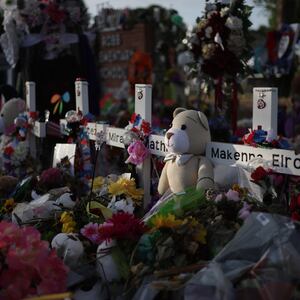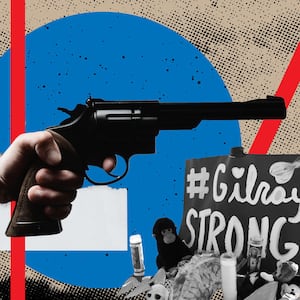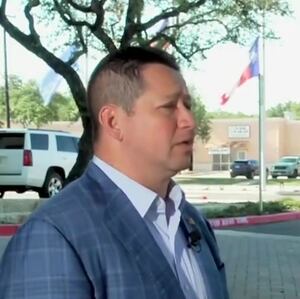On Nov. 30, 2021, Rep. Elissa Slotkin (D-MI) got the call that every elected official dreads.
That afternoon, a student at Oxford High School, in a sleepy suburb of Detroit, brought a gun to school and opened fire in a crowded hallway. Within just five minutes, nearly a dozen people were injured. Four students—ranging in age from 14 to 17 years old—would never come home from that day at school.
Slotkin, who was in Washington at the time, flew home and went straight to Oxford, one of the communities in her Michigan district. The immediate aftermath of the shooting was a blur for her, packed with meetings with law enforcement and school officials and time spent grieving with families at funerals and memorial services.
But as details began to emerge about how 15-year old Ethan Crumbley perpetrated the deadliest school shooting in three years, Slotkin and her staff saw a chance to act in hopes of preventing another one like Oxford.
Investigators in Michigan quickly learned that the semi-automatic handgun Crumbley used to murder four classmates was a gift from his parents. His father had purchased it just days before the shooting, and his mother posted on social media that they were “testing out” his “Christmas present.”
Crumbley was not legally of age to own a firearm, and before he went to school on Nov. 31, he allegedly took the weapon from an unlocked drawer. His parents were called to meet with school officials that day after an alarmed teacher found disturbing and violent notes and drawings; they allegedly refused to take him home.
The prosecutor in Oakland County ultimately charged Crumbley’s parents with involuntary manslaughter. But there was no state or federal law on the books that made the parents criminally liable for failing to secure the firearm that their teenage son used to commit murder.
“My staff started looking in D.C. at what safe storage laws had been proposed, what could we do,” Slotkin told The Daily Beast. “They came to me within a week with this idea of safe storage that mirrored the state law [that had been proposed in Michigan] so we could try at some level to prevent this from happening again in some other community.”
Within 10 days of the shooting, Slotkin was on the floor speaking about what she called the Safe Guns, Safe Kids Act, which would require parents to safely store their firearms—or face a five-year prison sentence if a child obtains one and harms themselves or others.
Six months later, more lawmakers have gotten the same horrific call Slotkin did. May 2022 will be remembered for the shocking carnage in Buffalo, New York—where 10 Black people were gunned down in a supermarket by a man seeking to kill them for their race—and Uvalde, Texas, where 19 third-graders and two teachers were murdered at school.
In response, Democrats in the U.S. House are moving to vote this week on a package of gun reforms. Its proposals serve as something of a grim directory to what Slotkin calls the “sick fraternity” of lawmakers whose communities have endured the trauma and tragedy of a mass shooting, or have been touched by gun violence in their own lives.
That fraternity is one that no politician ever wishes to join. But with more and more being inducted each year—and communities nationwide wondering which will be the next to be visited by the trauma of mass gun death—it is one that could reshape the fight to enact meaningful responses to the gun violence epidemic.
“Lawmakers who have been impacted by gun violence, either personally or in their community, have turned their grief into action,” said Shannon Watts, founder of the activist group Moms Demand Action, in a statement to The Daily Beast. “We don't need just thoughts and prayers from our lawmakers, we need policies and change to save lives.”
Slotkin’s safe storage bill is included in the package getting a vote this week. So is a bill regulating high-capacity ammunition magazines, authored by Rep. Ted Deutch (D-FL), who represents Parkland, Florida, where a 19-year-old man murdered 17 people at a high school in 2018.
Another proposal up for consideration comes from Rep. Dina Titus (D-NV), who proposed a bill regulating bump stocks, a device used to increase a weapon’s fire rate. She represents the part of Las Vegas where a man opened fire on a music festival in 2017, killing 60 people and wounding more than 400 more.
Before she was in Congress, Rep. Lucy McBath (D-GA) was a gun reform activist, not by choice but through the grief of losing her 17-year old son in a shooting. Her bill to enact federal “red flag” laws—which allow law enforcement or family members to prohibit someone from acquiring a gun if they’re believed to be a danger to themselves or others—is a key component of next week’s vote.
Rep. Salud Carbajal (D-CA) has dealt with the trauma of gun violence in his own life and in his home district. As a child, he found his older sister dead on the ground after she shot herself in the head. In 2014, Carbajal was serving as a county official in Santa Barbara when a 22-year-old man, seeking “revenge” on women, shot and stabbed six people to death. After that massacre, California passed its own red flag law. Carbajal’s bill to encourage other states to do the same is expected to get a vote next week.
These lawmakers’ bills represent just a share of the dozens of proposals that Democrats have put forward in recent years to respond to the seemingly endless cycle of gun violence, from mass shooting events to the sadly routine deaths that happen every day across the country. Overall, at least nine Democratic House members whose districts have been touched by a major mass shooting have introduced their own bills in response.
The induction to that group is swift and compassionate, Slotkin recalled. She said the first colleagues who called and texted her after the Oxford shooting were representatives of Parkland, Sandy Hook, and other places that are synonymous with the carnage of gun violence in America.
Deutch—who has become one of the Democratic caucus’s political and policy authorities on gun violence—was a particularly important resource in helping her navigate the aftermath of the tragedy, Slotkin said.
“His team couldn’t have been more helpful, not just in the emotional first days, but in having one and two-page memos on what congressional staff should be focused on in the wake of a school shooting,” Slotkin said.
The Michigan Democrat has sought to do the same for others now going through what she did last November. “I’ve reached out, in the same way Ted Deutch reached out to me, his district director reached out to mine. We’ve done the same thing in Buffalo and now with [Rep.] Tony Gonzalez down in Texas,” Slotkin said.
Gonzalez, a first-term Republican who represents Uvalde, is not poised to join the subset of this club that has proposed gun reforms in response to violence back home. His responses have been widely criticized by Democrats, but Slotkin says she has defended him. (“As someone who went through this, this is not what his community is looking for at this second,” she said.)
For the Democrats who have been moved to come up with legislation, that inspiration has often been rooted in flaws or loopholes in firearm rules that got exposed by the specific tragedy their community endured.
Slotkin’s bill is one clear example. In Deutch’s case, high-capacity magazines—defined as those holding more than 10 rounds of ammunition—had been of concern to gun-violence prevention experts for some time. But that concern resurfaced after the Parkland shooting, where investigators recovered magazines that could hold 30 and 40 rounds on the campus of Marjory Stoneman Douglas High School.
Bump stocks, meanwhile, were introduced to much of the world in grim and shocking fashion when a gunman unloaded hundreds of rounds of ammunition from a Las Vegas hotel room onto a country music festival in 2017. That device, many believe, is responsible for making that shooting the deadliest in U.S. history.
Titus’ bill is one proposal that was drawn up afterward to regulate bump stocks; in Congress, this particular reform has attracted more bipartisan interest than others and has come closer to passage.
Other proposals from Democrats that aren’t slated for immediate consideration are the product of similar circumstances. Rep. Jahana Hayes (D-CT), who represents Newtown, Connecticut—where the Sandy Hook massacre unfolded in 2012—has introduced legislation to define school shootings, and require the government to collect more comprehensive data on gun violence at schools.
After a gunman killed 10 people in a Boulder, Colorado, supermarket in March 2021, the area’s congressman, Democratic Rep. Joe Neguse, introduced a suite of legislative responses. One was a bill to prevent those with violent misdemeanor convictions from purchasing firearms, which Neguse has said might have prevented the Boulder shooting. He also proposed a bill directing the federal government to study the impact of gun violence in workplaces—like the Boulder supermarket—and develop gun violence guidance for employers.
For those members who have been affected deeply by gun violence, the work is as meaningful as anything they do on Capitol Hill. But it can still be remarkably painful, Carbajal told The Daily Beast.
“On a recent call, I just broke down,” he said. “I would say that as the subject comes up, it lends itself to discussion and sharing, but I find that people have been so traumatized—as someone who has experienced that, it’s still hard for me to raise it.”
But, Carbajal stressed, “no doubt, people who have gone through these tragedies and traumas, it lends themselves to understanding this issue and being advocates.”
For Slotkin, the pain in Oxford is still raw. She returns every month to check in on the community’s progress, and said the Uvalde tragedy “completely retraumatized” the teenagers and families there. And it’s in talking with those kids that Slotkin says reveals the biggest difference between lawmakers who have represented a community affected by a mass shooting and those who have not.
“It’s no longer theoretical,” Slotkin said. “You have to explain to a 17-year-old why your government can’t do basic, responsible things like background checks.”
The center-left lawmaker wants to see action as much as anyone, but she said she is fed up with leadership’s approach of wrapping several gun bills in one package, which Slotkin argues lets her GOP colleagues off the hook for opposing popular, narrower elements of the bill.
“My anger on this comes from the fact I had a school shooting and have to talk to these kids,” Slotkin said. “I don’t care what the reasoning is… the idea of doing a giant package just to have it fail in the Senate, it’s theater and it’s not a serious attempt to change laws.”











